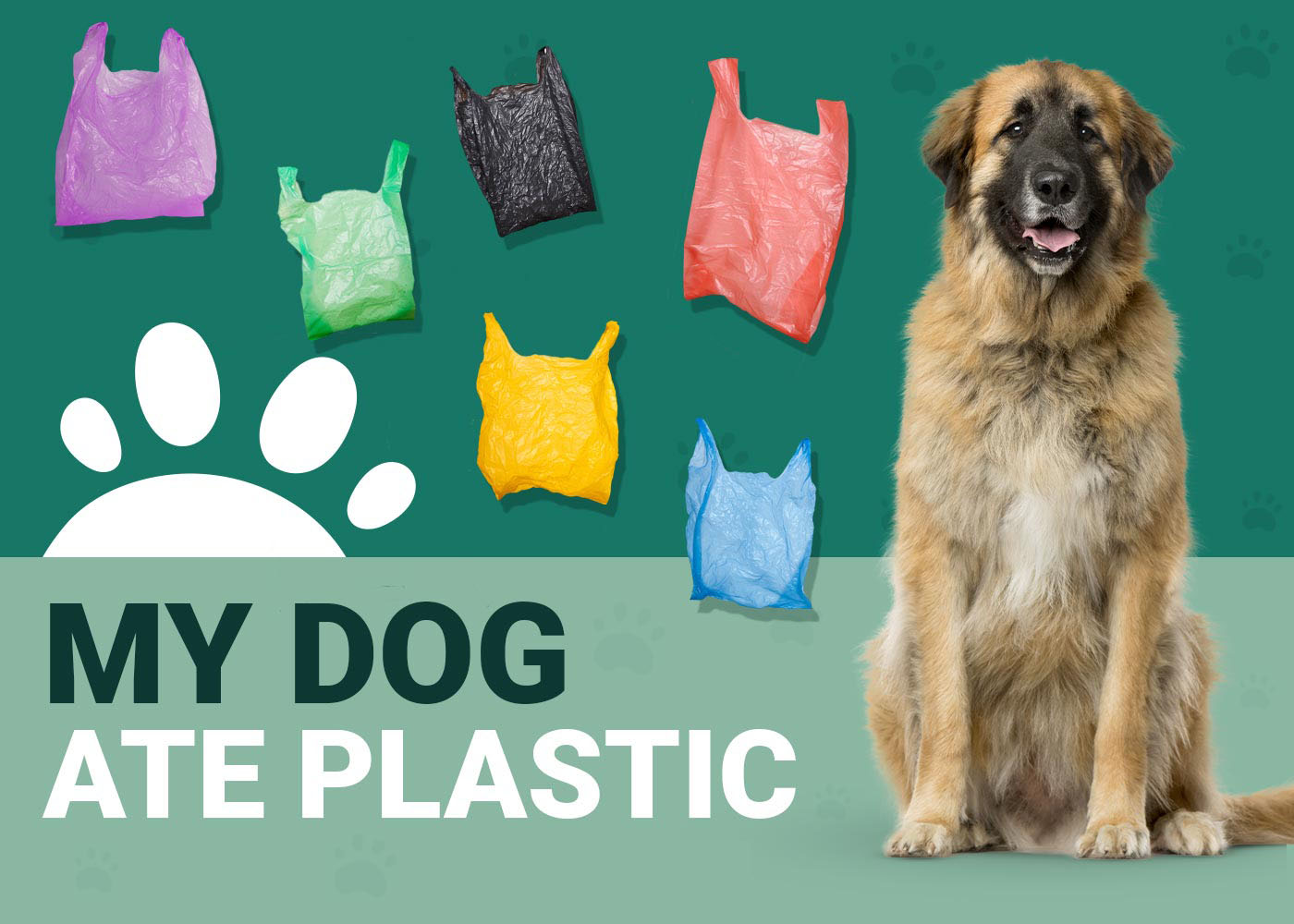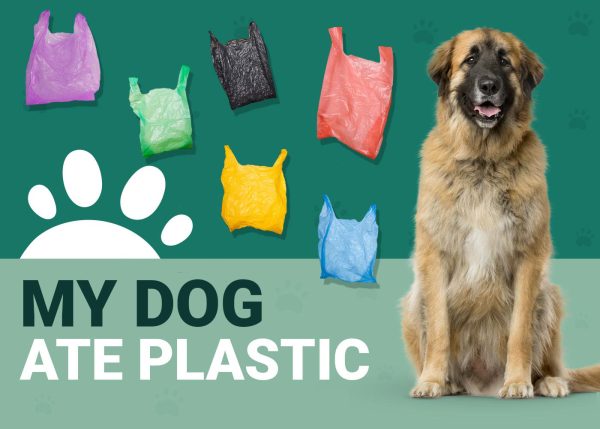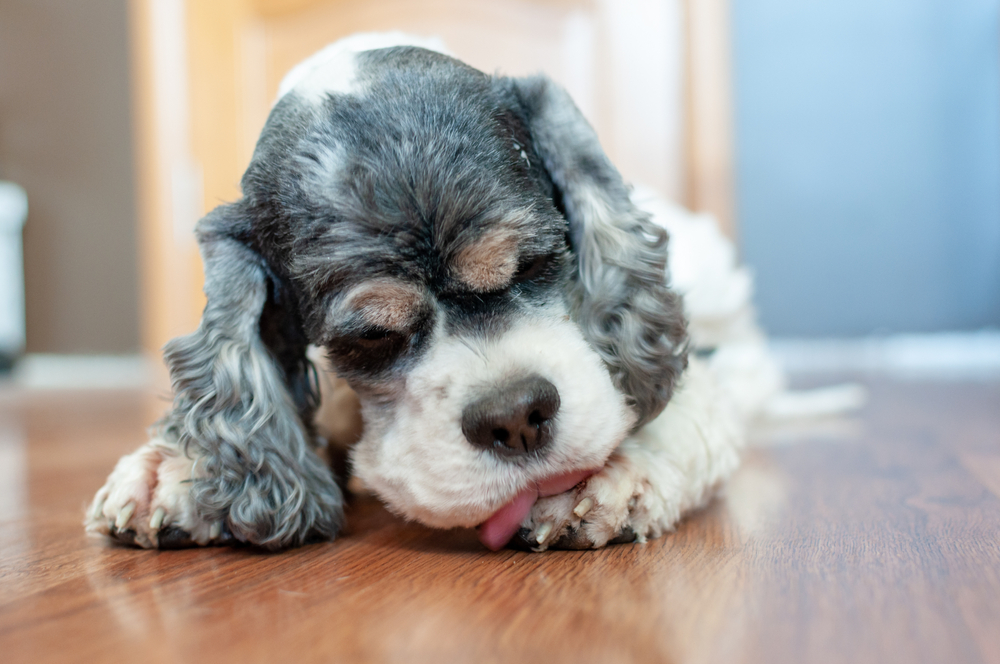Click to Skip Ahead
You’ve just gotten home and found trash strewn throughout your living room. The kitchen trash can is on its side, and your pooch looks guilty. You panic: should you be worried if my dog ate plastic? This is something you should be concerned about, but it does depend on a few factors.
Read on to learn more.

Should I Worry if My Dog Ate Plastic?
You should be concerned if your dog eats plastic. Plastic isn’t digestible, so it won’t break down in your dog’s gut.
The first thing you need to do is assess the damage. Can you figure out what your dog might have eaten? Is it more than just plastic, as in, could expired food have been eaten, pills, chemicals, chicken bones? That’ll help your veterinarian determine how aggressive they need to be when treating your dog.
Next, you need to call your veterinarian’s office. If they’re not open, contact your local veterinary emergency hospital. If there’s a chance your dog might have eaten plastic contaminated with chemicals or something else potentially toxic, contact the ASPCA Animal Poison Control1 at (888) 426-4435 or the Pet Poison Helpline2 at (855) 764-7661. They’ll also be able to make recommendations to your veterinary team.

If you need to speak with a vet but can’t get to one, head over to PangoVet. It’s an online service where you can talk to a vet online and get the personalized advice you need for your pet — all at an affordable price!
Hazards of Plastic
Plastic is dangerous to dogs for a variety of reasons. Because it’s not digestible, it can easily cause an obstruction within your dog’s gastrointestinal tract. That’s probably the most significant potential hazard to your dog’s health.
Plastic can get lodged anywhere once your dog eats it, from the esophagus to the small intestine. (If it reaches the colon, your dog will likely pass it.) A large dog that’s taken a bite of a milk jug may not have anything to worry about, but a Jack Russell Terrier may have trouble passing that same piece of plastic.
Depending on what type of plastic your dog has eaten, it could cause an airway obstruction. Biting off a piece of a rubber toy or swallowing a plastic grocery bag could block your dog’s airway.
Plastic can also have sharp edges when your dog chews on it. These plastic edges can be abrasive and cut up your dog’s mouth and throat, but they can also cause intestinal perforations. If it makes holes in the gut, the plastic can contribute to sepsis and be fatal.
Another big concern is what substance was in the plastic if it held anything. Were there pills your dog could’ve eaten? Was there detergent in a jug that your dog just ate? Was it a rat bait holder with a block of bait now missing? These chemicals or medications could be even worse than simply eating plastic. Your veterinary team will need information about anything your dog could’ve eaten to develop the best treatment plan.
Signs to Watch for if Your Dog Eats Plastic
If you’re unsure that your dog has eaten plastic or your veterinarian suggests monitoring your pup, you’ll want to keep a close eye on your dog.
If your dog shows distress, a veterinarian should evaluate your dog immediately. Potential signs of distress could include choking or gasping for air. If your dog is stretching their neck out, it could mean they’re having trouble breathing or have something lodged in their throat.
- Hunched back
- Tucked tail
- Pacing restlessly
If you can safely check your dog’s gum color, make sure their gums are nice and pink. You can also check your dog’s mouth to make sure no pieces of plastic remain wedged in their mouth.
- Vomiting
- Diarrhea
- straining to defecate
If you see signs like these, especially if they might have eaten something out of the ordinary, you must take your dog to the vet.
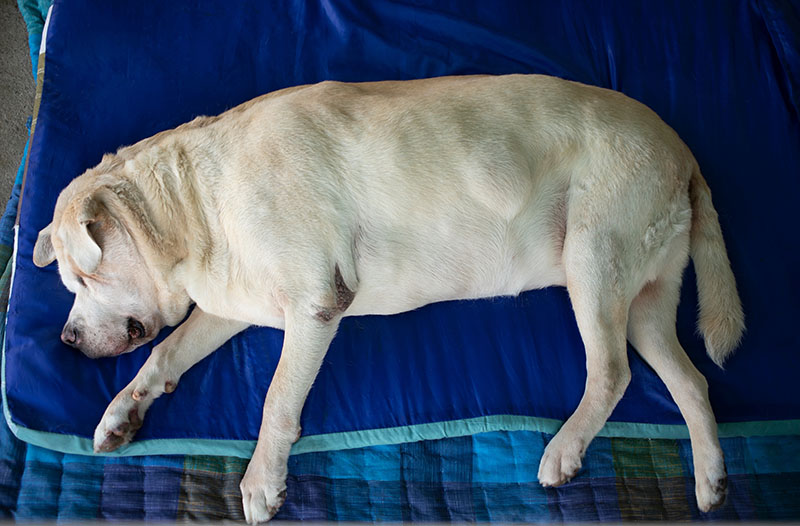
What Your Vet May Recommend if Your Dog Ate Plastic
Depending on what your dog ate and when your veterinarian may recommend that you trigger your dog to vomit with hydrogen peroxide. Please do not do this without getting the go-ahead from your vet because the plastic could get lodged in your dog’s throat, or your dog could choke on their vomit.
Your veterinarian will likely want you to bring your dog to the hospital for an exam. The doctor may also want to take radiographs (X-rays) of your dog’s belly. These diagnostic images can be tricky to interpret because lots of plastic isn’t dense enough (radiopaque), so they may give your dog a contrast material called barium to check for obstructions by monitoring the flow of the barium through the gut.
If they think it’s a good idea, your vet might give your dog medication to make your poor pooch vomit. If the vet makes your dog vomit, they might also need to give anti-nausea medication. They may also need to give your dog fluids and gastroprotectant medicine.
Let’s say you figured out your dog ate medication or a chemical while chewing up plastic. That’s a whole other can of worms. Your veterinarian may need to consult with a toxicologist to come up with a treatment plan for your fur baby. This plan will depend on precisely what your dog ate and how much.
- Vitamin K if your dog ate certain rat poison
- Intravenous fluids if your dog ate a bottle of ibuprofen
- Naloxone if your dog ingested an opioid medication
How Do They Remove an Intestinal Blockage in a Dog?
Your veterinarian may need to refer you to a surgeon if your dog has eaten plastic and has an obstruction. The type of treatment depends on where the blockage is.
If there’s something stuck in your dog’s throat, your vet may be able to get it out with special tools like forceps. Your veterinarian or a specialist they recommend may be able to use a special scope that features a flexible camera to retrieve items in the stomach.
Sometimes, exploratory surgery is needed. With this procedure, your vet will make an incision under anesthesia and evaluate the stomach, intestines, and other internal organs. They’ll open the intestines and remove the obstructing material before sewing the intestines back together.
The advantage of this type of procedure relates to its thoroughness. If a long-standing obstruction causes irreversible damage to the intestinal wall, your veterinarian could remove the affected portion of the gut. Depending on their location and extent, they may also be able to repair perforations.

Frequently Asked Questions (FAQ)
How long does plastic take to pass in a dog?
When your dog eats something, food takes roughly 6 to 8 hours to move through their gut. Some materials like plastic may take longer to pass through the intestines, especially if they’re long, large, or incapable of passing readily. In addition, certain things can make that transit time faster.
If your dog develops an obstruction from the plastic, it won’t pass on its own. Your veterinarian will recommend surgery in these cases, usually an exploratory laparotomy or an endoscopic procedure.
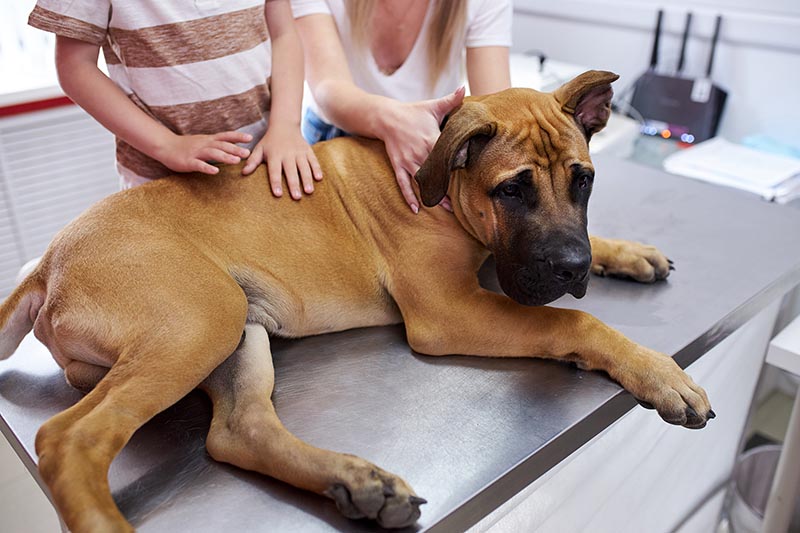
What are the signs of intestinal blockage in dogs?
If your dog has eaten plastic and you need to monitor for an intestinal blockage, here are some signs to watch for:
- Vomiting
- Diarrhea
- Straining or inability to defecate
- Weakness
- Restless behavior
- Bloating
- Abdomen is painful when touched
- Splinting or arching away from your touch
- Lack of an appetite
- Vocalizing
If you see any of those signs, you need to take your dog to the veterinarian for an evaluation immediately.
Conclusion
It’s scary when your pet eats something they’re not supposed to, but you now know what to do in an emergency like this one. Be upfront with your veterinarian about anything your dog could’ve eaten to get your pet treated as efficiently as possible.
See also:
- My Dog Ate Gum, What Should I Do? 3 Vet-Approved Steps to Take
- Garbage Gut in Dogs: Causes, Signs & Treatment (Vet Answer)

